Published on September 30, 2021 by Shweta Gupta
Oncology is the most dynamic therapy area with respect to research and development, new drug approvals, adoption of latest technologies, virtual clinical trials and emerging drug therapies. McKinsey expects the worldwide cancer therapeutics market to reach USD250bn by 2024, attributable to an acceleration in cancer cases and oncology spending. The oncology market has contracted significantly amid the COVID-19 pandemic, as the prime focus of all health-care professionals and doctors has shifted to the treatment of COVID-19 patients. Moreover, leading pharma and biopharma companies have faced considerable challenges with respect to research and development and new product launches within this space and oncology clinical trials have been put on hold or temporarily suspended since 2020.
This blog highlights the recent trends within oncology care practices, along with the impact of the COVID-19 exigency. Let’s first look closely at the recent trends and developments within the oncology space.
Trend #1: Precision medicine developments and adoption of next-generation sequencing technology
Precision medicine – an emerging approach for disease prevention and treatment – administers drugs depending on the genomics (omics), environment and lifestyle of a patient. With the growing advancement of cancer care, several precision therapies have gained approval in recent years. For instance, in 2017 Keytruda (pembrolizumab) was the first drug approved for the treatment of MSI-high solid tumour, followed by Rozlytrek’s (entrectinib) approval in 2019 for patients with NTRK fusion positive solid tumour.
Moreover, the rising need for personalised therapies, higher safety and efficacy, lesser side effects compared to other drugs and ease of integrating with other targeted therapies will likely drive the overall use and adoption of these therapies at the global level.
Next-generation sequencing (NGS) testing is one of the latest technologies for disease diagnosis. It arms pathologists with the wherewithal to identify or sequence large sections of a patient’s genome, which is used by doctors and research scientists to identify genetic variations for disease diagnosis and treatment.

Trend #2: Expansion of new CAR-T cell therapies and gene therapies
The last five years have been marked by the invention of novel treatment modalities including gene therapies, RNA-based cell therapies and vaccines, stem cell therapies and CAR-T cell therapies. The rising adoption of the latest gene editing technologies, including CRISPR and CAR-T cell therapies, would support the overall growth of the cell therapy market. More CAR-T cell therapies would be approved in the coming 2-3 years, which would significantly improve cancer treatment.
CAR-T cell therapies are marked by intense clinical trials and drug approvals. In March 2021, idecabtagene vicleucel (Abecma) received FDA approval for the treatment of multiple myeloma. Cell therapies offer improved safety and high potency, with lesser side effects than other chemotherapies. Scientists are continually working to develop new ‘off-the-shelf’ CAR-T therapies, which would be used to treat solid tumours
Gene therapies are being used as a potential curative treatment for chronic diseases including haematological conditions such as beta thalassemia. Additionally, treatments for other hematologic diseases, including haemophilia A and B, sickle cell anaemia and rare conditions that cause immunodeficiency, are currently undergoing clinical trials (in the advanced phase). While there are only a handful of FDA-approved cellular and gene therapies, hundreds of clinical trials are under way in oncology, neurological, cardiovascular and ophthalmologic conditions.

Trend #3: Rapid technological advancements
Digital transformation is rapidly altering the health-care landscape, with an increasing adoption of non-invasive surgical interventions including surgical robots and improved imaging technologies, which would have lesser side effects. Recent developments, such as 3D printing and bio-printing, would enable the replacement of malignant cells or organs from a patient’s body, improving the survival rate of cancer patients.
The rapid surge in artificial intelligence–based tools and software, teleconsultation and other online digital platforms would enable radiologists and oncologists to diagnose, detect and plan cancer treatments with high accuracy and precision.
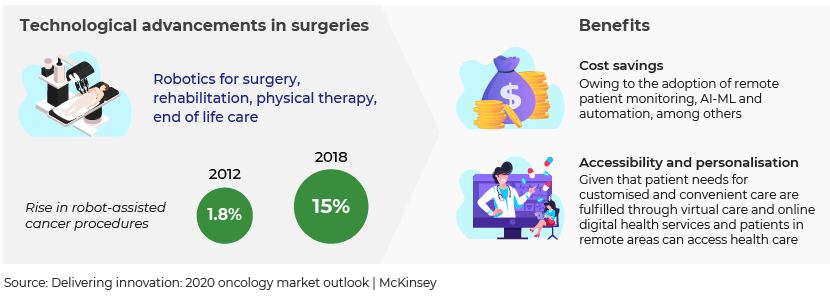
Trend #4: Immuno-oncology combination therapies
Leading biopharma and pharmaceutical companies are focusing on oncology clinical trials and adoption of new technologies to conduct virtual clinical trials. There has been intense competition within the oncology therapeutic area, with firms aiming for early product launches and adoption of immunotherapies in combination with other targeted therapies. The majority of the leading pharma and biopharma companies are focusing on investigating new mechanisms including immune check-point inhibitors such as BiTEs, antibody drug conjugates (ADCs), CTLA-4 inhibitors, PD-1 and PD-L1 inhibitors in order to bolster the oncology pipeline. The significant growth of immuno-oncology over the last five years is forecasted to continue and make this area one of the leading segments in oncology. While historically all immuno-oncology medicines were checkpoint inhibitors, focusing on PD-1, PD-L1 or CTLA-4, future approvals are eyeing up to 60 mechanisms, which target other aspects of the immune system. IQVIA expects global spending on immuno-oncology will reach USD50bn by 2025, due to rising demand of cancer immunotherapies and newer options for cancer care.
The second half of the blog delves on COVID-19 impact. In this section, we look closely at the impact on cancer care practices, cancer diagnosis, oncologists and cancer patients.
Impact #1: Cancer care practices
The COVID-19 pandemic has had a catastrophic impact on cancer care across the globe. Oncologists have observed a delay in c.76% of the total planned surgeries, nearly 35% fewer diagnoses have been conducted in 2021 so far compared to 2020 and 46% of the doctors had prescribed oral cancer medications to patients given the lack of hospital beds for chemotherapy sessions. All these factors will likely have significant ramifications on overall cancer care in the future.
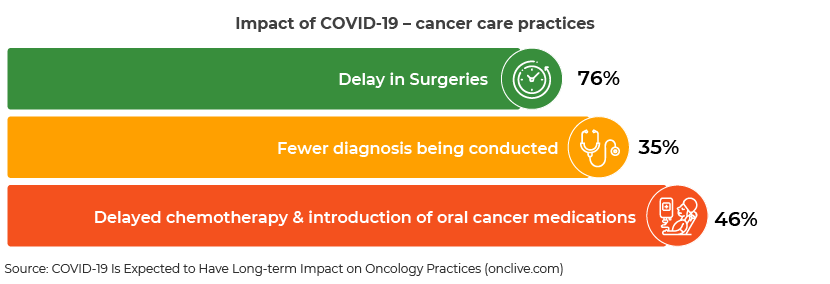
Impact #2: Cancer diagnosis
Nearly 22m screening tests for common tumours have been disrupted globally since 2020, risking delayed or missed diagnosis for c.67,000 patients. Diagnostics used to screen and monitor cancer have dropped dramatically amid the pandemic. Moreover, 86% of cancer cases at an early stage had delayed screening, 74% patients had to postpone their biopsy and c.27% imaging and biomarker testing has been delayed since 2020.
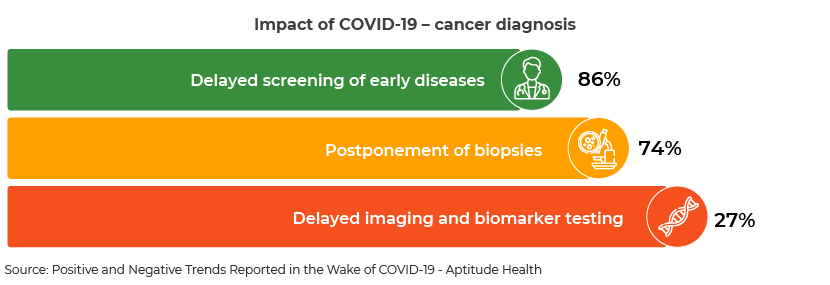
Impact #3: Oncologists
Since doctors, health-care professionals and oncologists have focused primarily on COVID-19, 55% of the oncologists have faced issues in diagnosing patients since 2020. In addition, participation of doctors and physicians in clinical trials fell 35% and 25% oncologists had fewer interactions with patients.
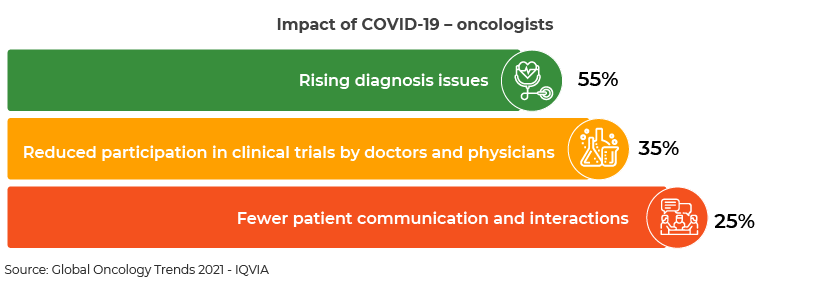
Impact #4: Cancer patients
67% cancer patients had to contend with appointment cancellations, 53% patients experienced increasing logistical challenges, due to new online/virtual working platforms, and 39% patients observed lack of personal engagement/counselling time. These were among the key challenges faced by the patients amid the COVID-19 exigency.
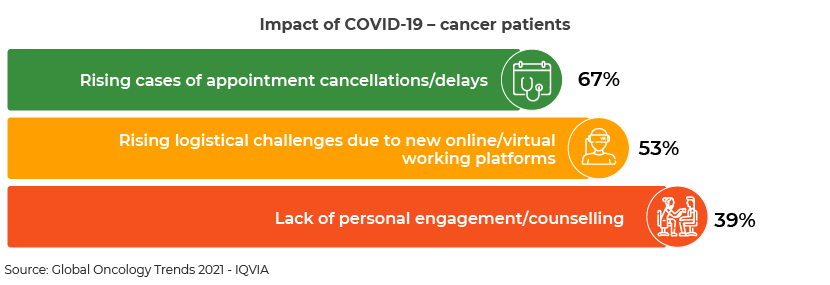
Even now, when the entire world is adapting to the new normal, the fear of infection has increased, routine care delayed and treatment options and later-stage diagnosis declined, resulting in a higher cancer mortality rate. So oncologists, research scientists and health-care professionals will have to work together as a team to overcome all the hurdles and bring the oncology therapeutics market back on track.
Conclusion
In totality, the oncology therapy area will likely continue to emerge as the most dynamic and leading therapy area within the pharmaceutical industry. It has immense potential to transform patient outcomes. Scientists and doctors will continue their research to develop novel and innovative technologies across the oncology space in order to fulfil unmet needs and ensure patient compliance.Moreover, rising government initiatives, increasing rates of oncology spending, adoption of the latest tools, and diagnostic software will boost the growth of the oncology market in the near future. Oncology market research will play a crucial role in identifying emerging trends and forecasting market growth. Precision medicines, CAR-T cell therapies, gene therapies and RNA-derived therapies have huge potential to propel the oncology therapeutic market in the future. However, all the leading pharma companies, doctors, scientists and patients will have to integrate their efforts to adapt to the new normal and generate innovative ideas to accelerate new product launches, successfully complete clinical trials and explore new treatment opportunities for cancer.
How Acuity Knowledge Partners can help
Leveraging nearly two decades of experience in analysing historical information and projecting trends, we help our clients, including life sciences and health-care consulting firms, build and strengthen their strategies and business.
We also provide bespoke research support on therapy area assessment, indication prioritisation, market research and forecasting, M&A, and due diligence and competitive intelligence.
For more information on our capabilities, please visit our Life sciences solutions page.
Sources
1. Delivering innovation: 2020 oncology market outlook | McKinsey
2. COVID-19 Is Expected to Have Long-term Impact on Oncology Practices (onclive.com)
3. New Horizons: Oncology Biosimilars - IQVIA
5. Positive and Negative Trends Reported in the Wake of COVID-19 - Aptitude Health
6. Current Oncology Pipeline Trends (pharmacytimes.com)
9. CAR T-Cell Therapy Approved for Multiple Myeloma - National Cancer Institute
10. advancements-in-oncology-how-tech-is-changing-the-field (physiciansweekly.com)
11. Four New Technologies That Will Change The Way Cancer Is Treated (labiotech.eu)
12. Oncology Trends - Part I, Market Trends Overview (bluematterconsulting.com)
13. Recent Trends in Cancer Research and Immuno-oncology (longdom.org)
14. Gene Therapy Market Size, Share & Industry Analysis 2026 (alliedmarketresearch.com)
15. Gene Therapy Market | 2021 - 26 | Industry Share, Size, Growth - Mordor Intelligence
16. Global Oncology Trends 2021 - IQVIA
Tags:
What's your view?
About the Author
Shweta Gupta has ~16 years of experience in research, consulting and advisory services. She is currently part of Acuity’s strategy research and consulting team, with experience in secondary research, business, and corporate strategy, thought leadership and competitive intelligence and benchmarking.
Prior to joining Acuity Knowledge Partners, Shweta Gupta worked with companies in the consulting, telecom and research analytics domains, where she was largely responsible for strategic research, corporate strategy, landscape study, market sizing, market entry and growth strategy, operating models, business models, opportunity analysis, company and product profiling and supplier identification.
Like the way we think?
Next time we post something new, we'll send it to your inbox










